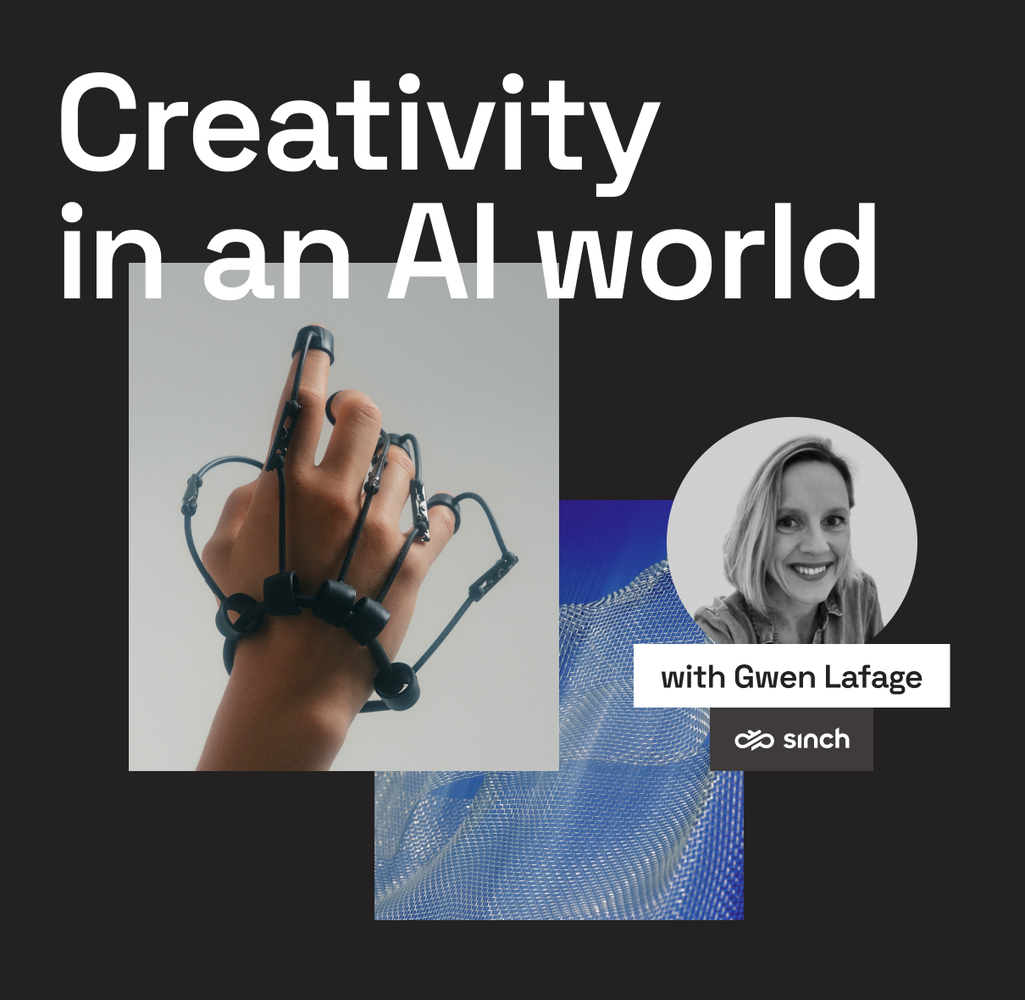
Creativity in an AI World: Gwen Lafage (Sinch)
Read insights from creative experts across a spectrum of disciplines, and discover how they're using generative AI as a supplement, not a substitute, for creativity.
Gwen Lafage is a global marketing leader and VP of Brand at Sinch. At Sinch as well as in previous roles, she focuses on creating impactful strategies and providing insightful thought leadership. Her advocacy for strong, brave brands is evident throughout this interview, where she talks about using generative AI to go further, faster, and bigger than ever before.

Toby: What do you find exciting about generative AI?
Gwen: The possibilities! It has an enormous potential to go further and faster than we have ever been. I like the idea of seeing it as a superpower to humans. The more we learn to leverage generative AI capabilities, the more we can automate boring tasks and do more in less time.
I think that we're stepping into a future where we can personalize our world and get creative on a whole new level. It's all about moving faster and pushing our limits, making everything from work to play a lot more exciting. And it’s only the beginning.
Toby: Which creative roles do you think could be most easily replaced by, or augmented by, AI?
Gwen: AI is really shaking things up in the creative world, but it's not about taking over jobs or replacing any creative roles. Instead, it's like having this awesome sidekick that amplifies what humans can do.
I think of it as a helper, as a boost for all creatives - writers, designers, videographers, musicians. But the creativity, the authenticity, the originality of the creative work cannot be done without the creative human brain.
And generative AI isn’t really there yet to get to the level of craft and quality that creative talents can provide.
Toby: What do you think are some of the challenges that generative AI poses for brands/companies?
Gwen: There are many challenges with gen AI for brands and companies. It’s going very fast with no boundaries, and that comes with copyright and intellectual property issues and even ethical concerns with the authenticity of content created; it becomes easier to misuse information or even create fake, misleading content. There are also big security and data privacy issues - companies need to be careful about how they use AI and keep up with the fast pace of changes while not exposing themselves too much. It’s tricky.
Toby: Do you think generative AI needs regulation - and how does that idea connect with creativity?
Gwen: It 100% needs some regulation. We are opening the door to a world we don’t fully know and control. We have to create some boundaries.
It is essential to create safe, ethical AI that is respectful of intellectual property rights, for example, without preventing innovation and creativity.
We need to build responsible AI as a stable foundation for innovation, ensuring that generative AI is used to enhance human creativity rather than replace it or exploit it unethically.
Toby: What AI tools do you currently use frequently/are interested in using in the future?
Gwen: I’m an AI enthusiast, but not that advanced yet. I have started to use tools to boost my productivity and creativity. I mostly use ChatGPT-4 all the time for a variety of tasks, from generating text to getting quick answers on a wide range of topics, even in my personal life. I've experimented with image generation tools or writing tools like Jesper; I've looked into meeting assistant tools as well, as I think they can really make meetings more efficient and actionable. But, I haven't been able to integrate them into my workflow yet due to our current IT policies.
Toby: So, is it easier or harder to be creative now compared with 5 years ago, with generative AI creating a sort of simulated creativity so easily
Gwen: I would say both. On one hand, AI tools have made it easier to produce creative work, offering everyone, from beginners to professionals, a quick way to generate ideas, art, and content. This accessibility can spark creativity in areas where individuals might not have expertise, making the creative process more inclusive.
However, this also brings challenges - if everyone is using the same process, it might make it harder to differentiate. I see many images looking just the same - while a few years back everyone was using the same stock images, in a few months, will everyone use the same AI-generated images? It raises a question about what it means to be truly creative and how we value originality. The implementation might be getting easier, but nothing will replace the human essence of creativity and personal expression.